Have you previously had gastric bypass surgery and are not satisfied with the results? Have you struggled to lose weight since day one? Or no matter how hard you try you can’t seem to keep the weight from coming back?
If the answer to any of those questions is “Yes”, then this is the article for you. In this article, we will discuss the different options for the revision of your gastric bypass and what you can expect the process to look like leading up to the surgery.
What is gastric bypass revision surgery?
Gastric Bypass Revision surgery is a secondary surgery following your original gastric bypass procedure. The purpose of this surgery is to modify the original surgery to improve results and/or side effects.
There are many different types of gastric bypass revision.
Examples of revision surgery include but are not limited to:
- Distal Roux-en-Y Gastric Bypass
- Revision of pouch and anastomosis
- Gastric band
- Shrinking of the stoma
- Endoluminal procedures
- Lengthening of the roux limb
Later in this article, we will discuss which type of revision may be best for you.
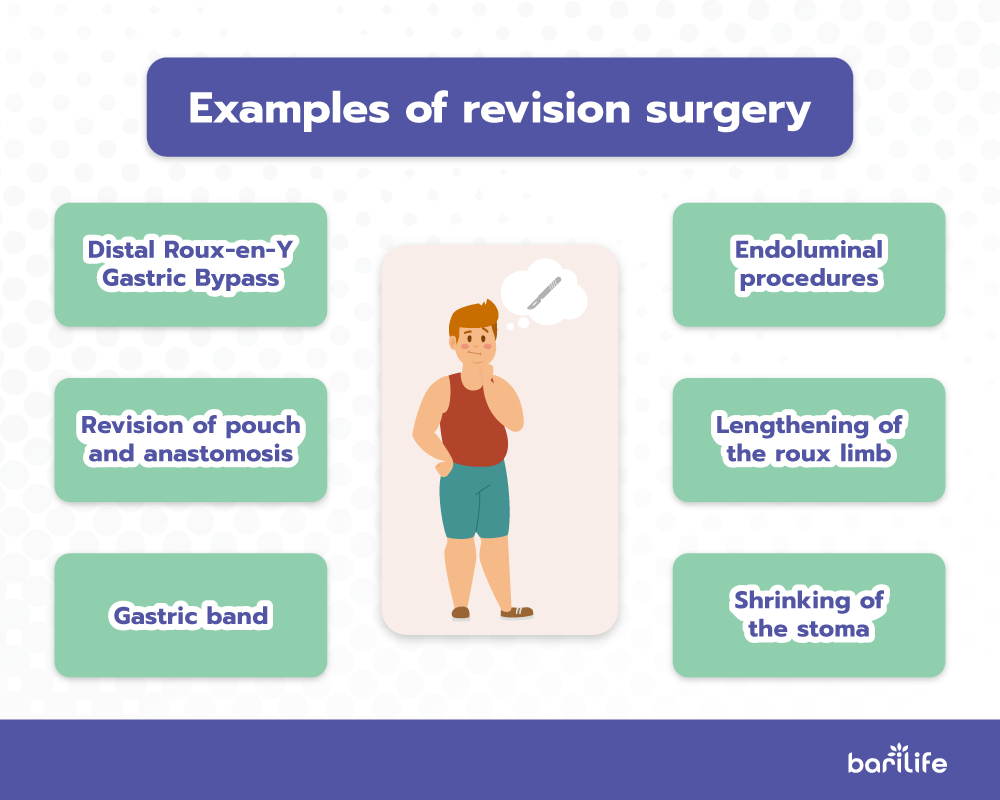
What is the difference between Revision surgery and Conversion surgery?
As mentioned above, revision surgery refers to the modification of the original gastric bypass procedure. The integrity of the original procedure remains intact but slight modifications are made to obtain the desired results.
Conversion surgery on the other hand refers to a second surgery that converts your original gastric bypass procedure into another form of bariatric surgery altogether.
Two examples of gastric bypass conversion include:
- Gastric bypass to the gastric sleeve
- Gastric bypass to the duodenal switch
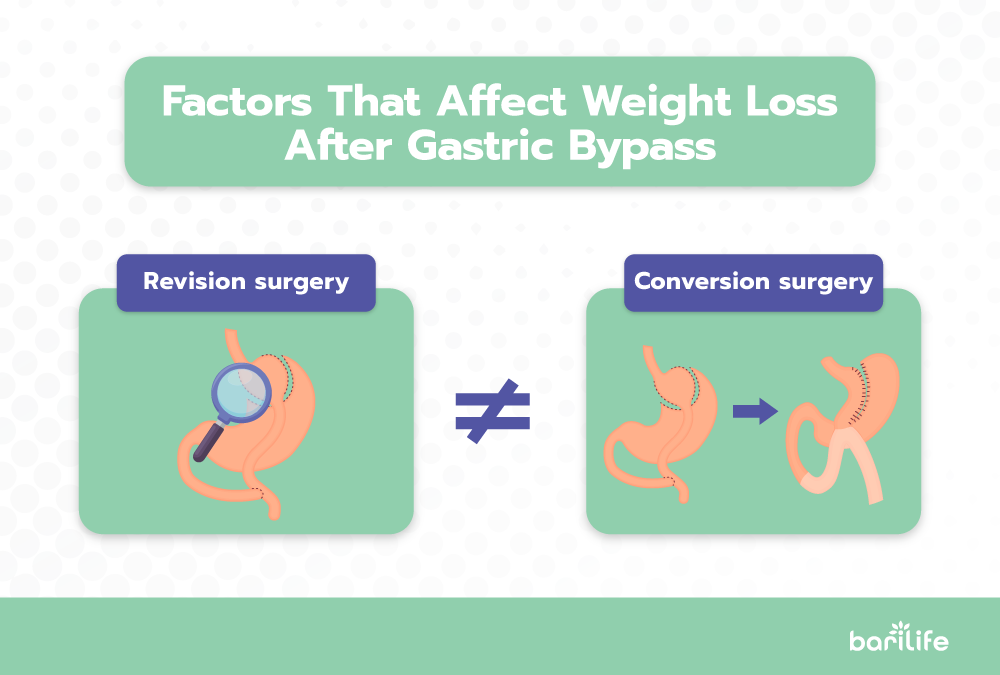
Why should you consider revision surgery?
There are two primary reasons to consider revision surgery
- If you are not satisfied with the results of primary gastric bypass.
Examples of this include
- Inadequate weight loss
- Weight regain
- If you experience significant side effects from your original surgery
- Ulcers
- Dumping Syndrome
- If you have experienced some weight loss but still are suffering from obesity-related diseases or morbid obesity
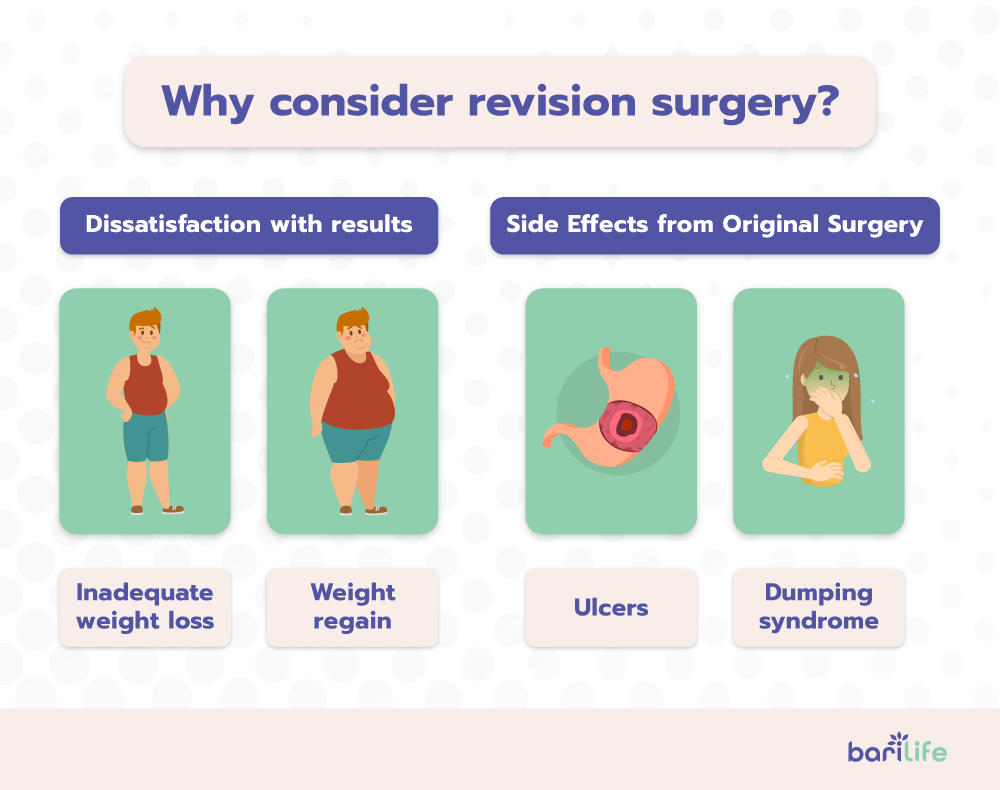
How to know if revision surgery is right for you?
The decision to have gastric bypass revision surgery is not something to be taken lightly.
Before you have revision surgery you will need to rule out any causes of weight regain, inadequate weight loss, and/or adverse side effects.
You will need to do a thorough assessment of your diet and lifestyle to ensure that these are not factors contributing to your undesired results. You will likely have to try diet and modifications before being approved for surgery.
Once diet and lifestyle factors are ruled out, your doctor will perform a series of tests and scans to determine if there is a physical cause preventing you from losing weight or causing adverse side effects.
Once all assessments are complete your doctor will then determine if you are a good candidate for revision surgery.
What you should expect before you are approved for revision surgery.
Weight regain following bariatric surgery may be more common than you think. When trying to lose weight or prevent weight regain you will need to follow a short-term strict diet.
This diet is called The Jump Start Diet. It is a short-term low volume, high-protein diet. This diet is designed to help you jump-start weight loss and get you back on track.
Following the Jump Start Diet, you should continue to follow a low calorie, high protein diet
- Diet
- Focus on Incorporating
- Fruits, vegetables, lean protein (fish, poultry, legumes, eggs, nuts, seeds), high-fiber bread and cereal products, and low-fat dairy.
- Try to reduce your intake or eliminate
- Foods that are high in calories, sugar, and fat.
- Try to focus on a Low-calorie High protein diet
- Protein will help you feel fuller and lower calorie intake will help with weight loss
- Exercise
Aim for at least 30 minutes of physical activity 5 days a week.
- Cardio should be incorporated 2-3 times per week
- Resistance training should be incorporated 2-3 times a week to promote weight loss and build muscle.
- On your days off try to get some movement in whether it be a nice walk or some stretching.
Try this 30-minute at-home workout
2 rounds
- 15 air squats
- 15 glute bridges
- 15 deadlifts with light dumbells*
2 rounds
- 20 bicep curls (10 each arm) with light dumbells*
- 20 tricep press (10 each arm) with light dumbells*
- 10 dumbell reverse fly with light dumbells*
2 rounds
- 10 burpees (step back into plank and stand for low impact)
- 20 jumping jacks (step one hand and one arm out for low impact)
- 30 sec plank (up on hands or down on elbows with the option to drop the knees if needed)
*For the light dumbbells, choose a weight that works best for you. If you are new to working out try 2-5 lb dumbells and increase the weight as you get stronger.
Honor your body and do not over-exert yourself.
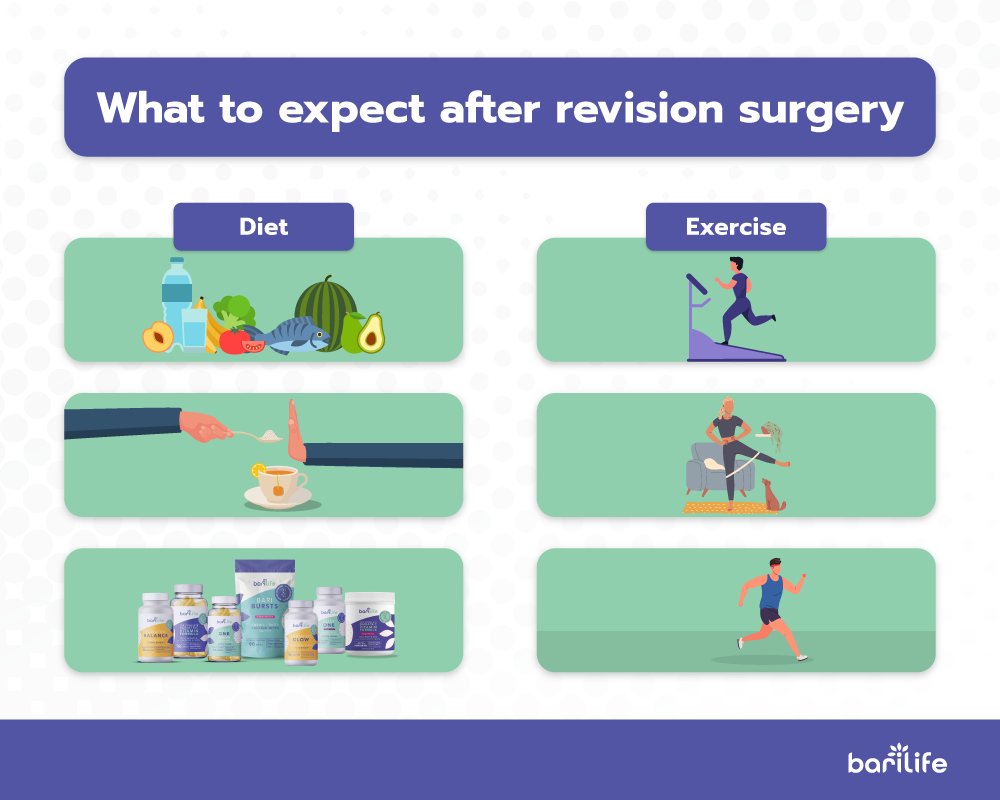
What is the best type of revision surgery?
It is likely that your bariatric team or surgeon can help you to determine which type of revision or conversion surgery is best for you, but it is just as important to be your own advocate and to do your own research.
There are a few different factors that you should consider when trying to determine the best type of revision surgery for you.
The first factor to consider is the primary reason you are wanting revision surgery. Certain types of revision surgery have been proven to be more successful for specific side effects or symptoms.
If you are looking to improve Weight loss you may consider the distal gastric bypass or conversion to duodenal Switch.
If you are suffering from ulcers. The revision surgery may include cutting out the anastomosis and redoing it or reversal of the bypass altogether.
- It is important to note that ulcers are often the side effect of smoking. If you are going to revise the surgery and you are a smoker then you will also need to quit smoking.
If you are suffing from dumping syndrome the best approach may be to reverse the bypass altogether. Following the reversal of your original bypass there may be an option to convert to the gastric sleeve later down the road.
The second factor to consider is the experience level of your surgeon. Not all surgeons who perform bariatric surgery are familiar with the various forms of revision surgery. It is very important to find a surgeon knows how to perform the right type of revision surgery for you.
Do not be afraid to interview multiple surgeons and to find the one you are most comfortable with.
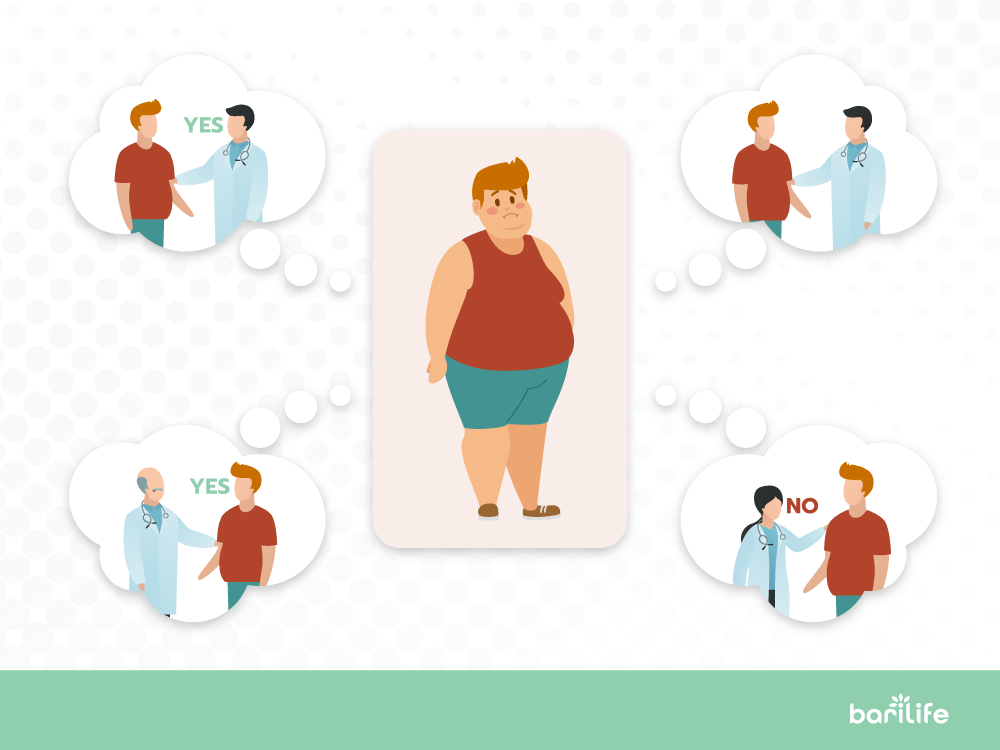
Questions to ask your surgeon about revision surgery
- Ask your surgeon about his experience performing revision surgeries
- Again, if your surgeon does not have experience performing the revision surgery you are interested in, don’t be afraid to consult with another surgeon.
- Ask your surgeon which surgery he thinks is best for you
- Have your surgeon and team of bariatric professionals walk you through the recovery process so you know what to expect
What is the estimated cost of gastric bypass revision surgery?
The estimated cost of gastric bypass revision surgery can range anywhere from $20,000 to $30,000.
Don’t lose all hope just yet! There is a chance that insurance may cover it, so you don’t have to pay the expensive out-of-pocket costs.
Insurance companies are more likely to cover the cost of revision surgery if you meet any of the following criteria
- You have a significant medical complication caused by the original surgery
- You have a BMI greater than 35 and a health condition despite 50% weight loss after the original surgery
- You have a BMI greater than 40 despite 50% weight loss following the original surgery
You will have to be able to prove that the original procedure didn’t work and factors like diet and exercise were not contributing factors.
If your diet and exercise history show that you were non-compliant or you did not make the right choices, then you will have a difficult time getting insurance to cover your revision surgery.
The type of revision surgery that you are considering might also impact an insurance company’s decision to cover the cost.
That’s a wrap!
When considering revision surgery, make sure to rule out all diet and lifestyle factors before you commit to surgery. Once you have decided that surgery is the right option for you, be sure to be your own advocate.
Interview your surgeon as well as others and see their recommendations and experience. Following revision surgery, you will still need to follow a healthy diet and lifestyle to achieve your desired results.





What are your tips and tricks to post-bariatric success?